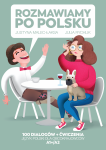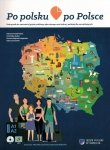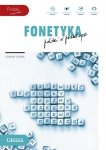-
Załączniki bezpieczeństwa
Załczniki do produktuZałączniki dotyczące bezpieczeństwa produktu zawierają informacje o opakowaniu produktu i mogą dostarczać kluczowych informacji dotyczących bezpieczeństwa konkretnego produktu
-
Informacje o producencie
Informacje o producencieInformacje dotyczące produktu obejmują adres i powiązane dane producenta produktu.Preston Publishing
-
Osoba odpowiedzialna w UE
Osoba odpowiedzialna w UEPodmiot gospodarczy z siedzibą w UE zapewniający zgodność produktu z wymaganymi przepisami.
Gramatyka języka polskiego wydaje Ci się niemożliwa do opanowania, a brzmiące w szczebrzeskiej trzcinie chrząszcze nie dają Ci spać? „Speak Polish. A practical self-study guide + nagrania online“ to propozycja dla Ciebie!
W książce znajdziesz wiele przydatnych zdań w języku polskim, które będziesz mógł wykorzystać w codziennych sytuacjach, a także przystępne informacje na temat polskiej gramatyki przedstawione w języku angielskim. Dołączony do książki kurs audio ze zdaniami nagranymi przez natywnego lektora ułatwi Ci natomiast opanowanie największych zawiłości wymowy.
Dzięki tej książce:
- nauczysz się podstaw polskiej gramatyki, korzystając z przystępnie podanych wskazówek,
- razem z polskim lektorem przećwiczysz wymowę i utrwalisz przyswojoną wiedzę,
- poznasz podstawowe zwroty w języku polskim, które ułatwią codzienną komunikację.
To doskonała książka zarówno dla tych, którzy dopiero zaczynają swoją przygodę z językiem polskim, jak i dla nauczycieli języka polskiego jako obcego, którzy poszukują materiałów do pracy ze swoimi uczniami.
Speak Polish. A Practical Self-study Guide is a new manual for students of Polish as a foreign language.
Containing lists of sentences sorted according to grammar points, the course starts with the most basic concepts and takes the student on a journey towards more advanced grammar. The first part of the series is dedicated to students at levels A1-A2. Each chapter contains over 30 sentences which need to be translated and then compared to the correct answer provided on the right-hand side. This way, students have a chance to understand and practise a particular grammar point using everyday sentences. They can also correct their mistakes and review the vocabulary used in the sentences. The explanatory notes provided next to the sentences clearly present the theory and point out common mistakes made by learners. The book comes with complete audio online course in two versions: English-Polish to practise speaking and Polish only to practise pronunciation and listening comprehension.
Spis treści / Table of contents - Speak Polish. A practical self-study guide. Part 1
Introduction
Pronunciation.
1 Useful expressions | Przydatne wyrażenia.
How to say hello in Polish or ask your friend how he/she is doing?
2 The gender of nouns. Adjectives with nouns | Rodzaje rzeczowników. Przymiotniki z rzeczownikami.
What are the genders of Polish nouns and adjectives?
3 The verb to be | Czasownik być.
Learn one of the most important verbs: to be.
4 The verb to have | Czasownik mieć
Let’s practise the verb to have.
5 The numbers 1-20 | Liczby 1-20.
Memorize the numbers from 1 to 20.
6 The numbers 21-199 | Liczby 21-199.
After this unit, you will be able to count till 199.
7 Possessive pronouns | Zaimki dzierżawcze
How to say my, your or our in Polish? Let’s practise the possessive pronouns.
8 Conjugation of verbs 1 | Koniugacja czasowników 1.
It’s impossible to build sentences without verbs. Learn how to conjugate them.
9 Conjugation of verbs 2 | Koniugacja czasowników 2.
Here you will find out more about conjugation of the verbs.
10 Conjugation of verbs 3 | Koniugacja czasowników 3.
Let’s conjugate even more Polish verbs!
11 Asking questions | Zadawanie pytań.
It is very important to know how to ask questions in Polish. Learn it here!
12 Telling the time | Podawanie godziny.
Here you will find out what to answer when you hear a question like What time is it?
13 Accusative 1 | Biernik 1 .
Here you will understand when and how Polish people change the endings of the words.
14 Accusative 2 | Biernik 2 .
Let’s learn more about the accusative case!
15 The plural of nouns and adjectives | Liczba mnoga rzeczowników i przymiotników.
Here you will find some information about the plural form in Polish.
16 Adjectives ending in -owy, -owa, -owe | Przymiotniki -owy, -owa, -owe.
Let’s find out how to say orange juice or chocolate cake in Polish.
17 Modal verbs | Czasowniki modalne.
Here you will learn how to say: I can, I have to, I must or I should in Polish.
18 The verb to know | Czasowniki znać i wiedzieć.
Let’s learn how to express the verb to know in Polish.
19 Conjunctions | Spójniki.
Learn how to say but, because and other conjunctions.
20 Review 1 | Powtórka 1 .
Test yourself.
21 Past tense | Czas przeszły.
After this unit, you will know how to speak in the past tense.
22 Past time expressions | Wyrażenia określające przeszłość.
Here you will learn how to say in Polish: yesterday, one week ago, two years ago, etc.
23 Instrumental 1 | Narzędnik 1.
It is time for another grammatical case: the instrumental.
24 Instrumental 2 | Narzędnik 2.
Here you will learn more about the instrumental case.
25 The verb to go | Czasowniki iść, chodzić, jechać, jeździć .
How to say to go in Polish?
26 I like | Lubię, podoba mi się.
Is the verb lubić the only way to say that you like something?
27 Personal pronouns in the accusative | Zaimki osobowe w bierniku.
It is important to learn more about personal pronouns.
28 Personal pronouns in the instrumental | Zaimki osobowe w narzędniku.
Here you will find out how to say: with me, with you, with her, etc.
29 The comparative of adjectives | Stopniowanie przymiotników.
You have already learnt how to say good. But how to say better or the best?
30 Genitive singular | Dopełniacz w liczbie pojedynczej.
Let’s learn what the genitive case is.
31 Pronouns in the genitive | Zaimki w dopełniaczu .
How to say it is for her or I don’t like him? Let’s find out!
32 There is…, There are… | Jest…, Są….
How to express there is or there are in Polish?
33 Of + genitive | Of + dopełniacz .
Do you know how to say my brother’s dog or the beginning of the meeting?
34 Imperfective and perfective | Aspekty dokonany i niedokonany.
Why do Polish people sometimes say jeść and sometimes zjeść?
35 Future Simple | Czas przyszły prosty .
After reading this unit, you will be able to express the future.
36 Irregular verbs in the Future Simple Tense | Nieregularne czasowniki
w czasie przyszłym.
It is time for irregular verbs in the future tense.
37 The compound future tense | Czas przyszły złożony.
How to ask your friend what she or he will be doing tomorrow?
38 I have a headache | Boli mnie głowa .
Do you know how to say that you have a headache? You will learn all about it in this unit.
39 The adverb | Przysłówek .
You have already learnt many adjectives in Polish. Let’s have a look how to form adverbs.
40 Review 2 | Powtórka 2 .
Check yourself and translate the sentences into Polish.

 100 szt.
100 szt.










 3 szt.
3 szt.